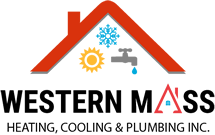Improve Indoor Air Quality
Fresher, cleaner air for your family and you.

Most of us take the air we breathe at home for granted, not realizing that it can be even more polluted than the air outside. According to the EPA, poor indoor air quality can have a significant impact on a building's occupants' health and comfort. But is often overlooked.
Your Health Matters
While indoor air pollution's short-term effects range from itchy eyes and runny noses to headaches, dizziness, and fatigue, there is a more serious cause for concern. This concern revolves around the impact of prolonged exposure to the following:
Moisture: If not adequately ventilated in places like laundry rooms, basements, and bathrooms, a buildup of moisture over time can cause mold and mildew, which is dangerous to both the structure of the house and the health of the family inside.
Off-Gases: Given off from construction materials, carpets, adhesives, and even household cleaners & solvents, these gases can accumulate and cause harm in tightly built homes.
Particulates & Allergens: From dust, pet dander, pesticides, cleaning supplies, tobacco smoke, and even cooking effluents, the causes of particulate pollution are many. In homes that are not ventilated properly, this particulate pollution can cause air quality indoors to be 100 times worse than the air outside.
According to the American College of Allergy, Asthma, and Immunology, allergies are the 6th leading cause of chronic illness in the U.S., with nearly 50 million Americans suffering from some form of allergy every year and spending upwards of $18 billion on allergy relief - products, treatment, and care.
At Western Mass Heating & Cooling, we understand the importance your family's health, which is why we have a wide range of indoor air quality products & services that create a healthier atmosphere within your home, by focusing on the following three ‘offenders’: Allergens, Chemicals, smells, and other Volatile Organic Compounds (VOCs), and Outdoor air pollution. Our long-term goal as a company is to offer our customers the very best tools available to fight against the causes of seasonal and long-term allergies that could be negatively affecting their health and well-being.
Energy Recovery Ventilators (ERVs)
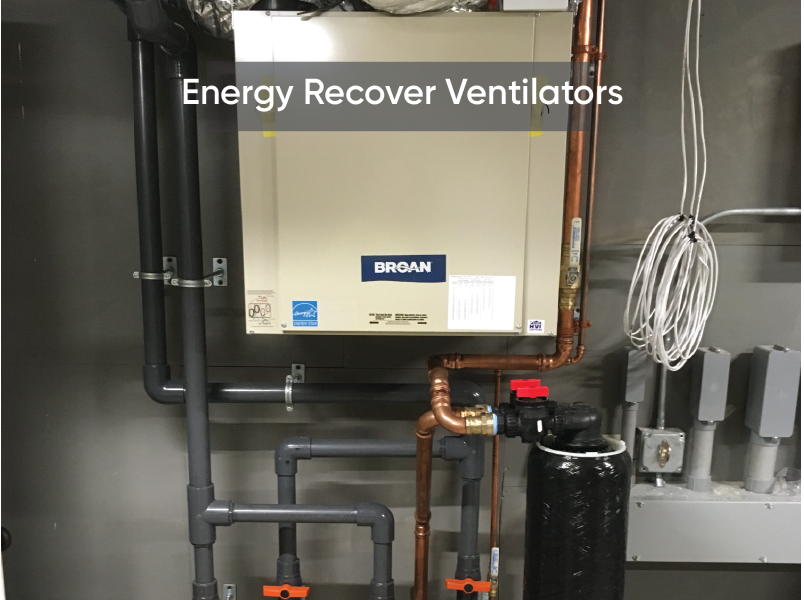
Homebuyers today are more energy-conscious than ever before. From 'green' construction standards to systems that help reduce their home's overall operating cost, modern residential houses are better insulated and airtight than ever. While these higher construction standards help reduce energy costs, they do have a negative impact on indoor air quality levels.
To solve this problem and help maintain a healthy atmosphere indoors, we offer a wide range of Energy Recovery Ventilation (ERV & HRV) Systems, and Air Exchanger Systems that combine stellar performance with incredible energy efficiency to deliver a constant supply of fresh, filtered air into your home.
Frequently Asked Questions (FAQs)
Do I need a ventilation system in my home?
Absolutely. In certain circumstances, the quality of air indoors can be nearly 100 times more polluted than outside air, according to the Environmental Protection Agency (EPA). The easiest way to avoid this problem is through a ventilation system. The other benefits are:
-
It reduces the number of allergens in the air.
-
It ensures a steady stream of fresh, filtered oxygen.
-
It eliminates odors and gasses released from building materials in newer homes.
-
It addresses moisture buildup in areas like laundry rooms and bathrooms to keep mold and mildew at bay.
-
It is safer than keeping windows and doors open to allow for air circulation.
What types of ventilation systems exist?
There are two types of ventilation systems for residential homes:
-
Heat Recovery Ventilation Systems
-
Energy Recovery Ventilation Systems
The main difference between these two systems lies in the amount of moisture allowed to remain in a given space. HRV's are best suited to areas with a lot of humidity and extreme cold climate. The HRV system conditions incoming air utilizing the waste-energy from the outgoing air, while keeping humidity levels to a bare minimum. ERV systems, on the other hand, work the same way but allow for some amount of moisture in the room to remain. We tend to suggest ERV systems in our region, but it is situational.
Which ventilation system - HRV or ERV - is right for my family?
Choosing between ventilation systems is as easy as considering three points:
-
The climate where you live: If it's long and dry for most of the year, an ERV is ideal as it will allow for some moisture to remain indoors. If it's humid and sunny, an HRV (or an ERV with a Dehumidifier) is the perfect choice as indoor spaces with less humidity are more comfortable for family members.
-
Existing health conditions: Does dry air cause nosebleeds and skin allergies for a family member? Do they react negatively to humid air? Understanding the triggers of family members' existing health conditions is critical when deciding which ventilation system to use.
-
The design of your home: Depending on the design and size of your home, your contractor can present four different options when it comes to the installation of the ventilation system:
-
A fully ducted system
-
A simplified system
-
An attic installation system
-
A ducted exhaust system
-
Humidifiers & Dehumidifiers
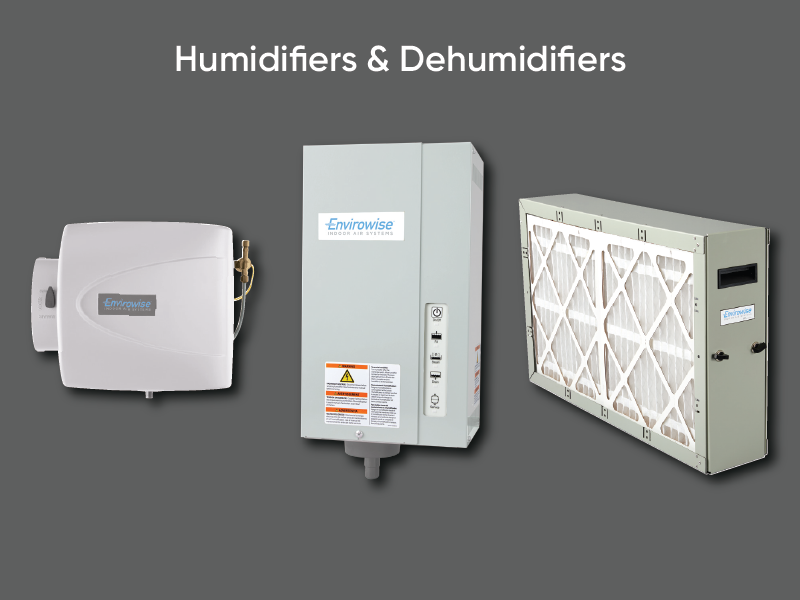
A house that has a consistent humidity level throughout the year is one that has a happy, healthy family calling it home. This consistency is an essential part of the overall indoor air quality. Home Humidifier Systems that provide a consistent humidity factor also has other real benefits to the occupants of a house. These benefits include:
-
Keeping viruses like the Flu and allergies at bay: It is a proven fact that viruses like the Flu and other molds that cause allergies and asthma thrive in indoor environments that are excessively dry or damp.
-
Reduced energy costs: A home with too much or too little humidity forces air conditioner or furnace systems to work that much harder to maintain a comfortable indoor environment—a balanced humidity level results in lower energy costs in the long run.
-
Increased comfort: Whether you're living in a warm sunny region or a cold, dry region, keeping a constant level of humidity in your home can make a world of difference in how comfortable your family is year-round.
-
Construction Longevity: A constant humidity level also helps preserve the natural lifespan of wooden floors, beams, and furniture by keeping warps, cracks, mold, and destructive insects at bay.
Frequently Asked Questions (FAQs)
What is the ideal humidity level for my home?
Regardless of where you live, a balanced relative humidity level is essential for a healthy lifestyle. A relative humidity level between 30 to 50% is ideal for comfort, and to prevent microorganism growth.
What kind of humidifiers are available?
Although which humidifier to use for your home depends to a large extent on house-size, family-size and current heating and cooling system, in general, we have three different kinds of humidifiers on offer:
-
Bypass Humidifiers: These whole-house humidifier systems pull warm air from the home's heating ducts or furnace and push it through a water panel. The warm air absorbs moisture and is pumped into the air system for circulation throughout the home.
-
Fan Powered Humidifiers: Similar to Bypass Humidifiers, these systems come with a powered fan that pushes air across the water panel for greater water evaporation.
-
Steam Humidifiers: Steam humidifier systems have one significant advantage over both Bypass and Fan-Powered humidifiers in that they can work independently of a home's heating system. They achieve this by boiling water until it turns into steam and adding it to the air circulating through the home’s ductwork.
What are the ideal spaces in my home for a humidifier and a dehumidifier?
While humidifiers are an almost ‘must-have’ for the entire home, dehumidifiers are needed in spaces within the home where moisture can accumulate and linger without proper ventilation. This build-up of moisture can result in the growth of unhealthy mold, wood rot, insects like dust mites, and more. Examples of these spaces are basements, crawl spaces, garages, home theatres, workshops, home gyms, gun rooms, etc...
Air Filtration Systems
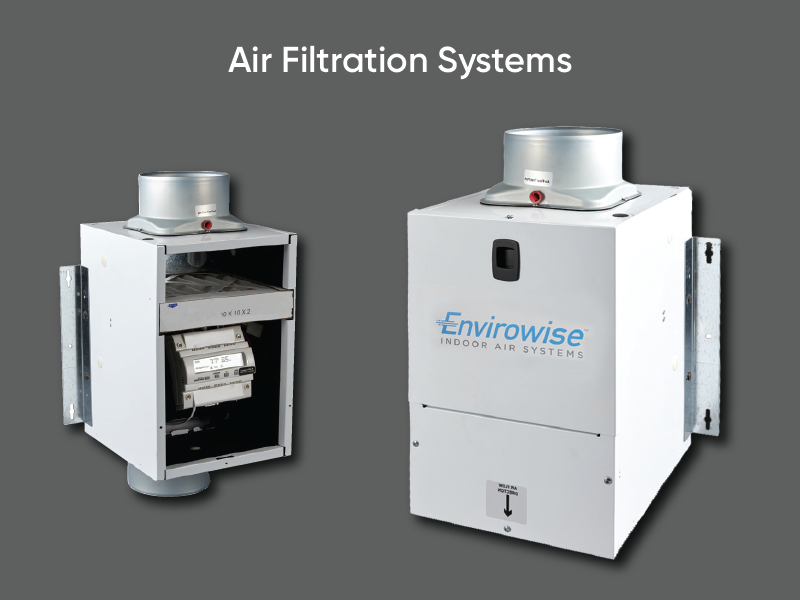
With building and construction codes becoming more stringent in recent years to meet higher energy-efficient standards, most modern residential homes are very well insulated. While this is good at keeping energy bills low, the air-tight construction can cause dirty air to circulate within the house, which is harmful to your health and overall indoor air quality. To counter this problem, the air filtration system for homes we recommend work within your house’s existing ductwork and filter the air of any microscopic allergens that can cause breathing problems or other health issues.
Frequently Asked Questions (FAQs)
What are the different kinds of air filters?
Overall, there are seven different kinds of air filters that can be used in the air filtration systems in your home:
-
HEPA filters: High-efficiency particulate air (HEPA) filters are the best at removing at least 99.97% of airborne allergens and particles.
-
UV Filters: These filters use ultraviolet light to kill bacteria and viruses like mold spores.
-
Electrostatic Filters: These filters use cotton and paper fibers to create a static charge that attracts dust and other airborne particles.
-
Washable Filters: Primarily intended as an environmentally friendly option, these filters only need a good wash every few months to keep them performing.
-
Media Filters: These filters offer high MERV (Minimum Efficiency Reporting Value) filtration with none of the side effects of running similar non-media systems i.e. high static pressure, inadequate filtration, frequent filter changes and no odor control.
-
Spun Glass Filters: Simple to setup and cheap to run and replace, these filters are exceptional at trapping particles like lint and dust.
-
Pleated Filters: These filters are ideal for indoor environments where lots of debris and particles need to be filtered due to their large surface area.
Can air purifiers remove any unpleasant odors?
Yes, depending on which filter is used. Activated carbon filters are incredibly effective at removing any unwanted odors within the home - from smoke, pets, garbage and so on. HEPA filters on the other hand are more effective at removing allergens and other microscopic particles.
Are air purifiers expensive to operate?
Depending on the model selected, the main overheads are filter cost and electricity. While certain models such as CleanEffects™ from Trane do away with filter replacement altogether, other models would need the filters replaced every few years for optimum performance.
HVAC Cleaning & Maintenance
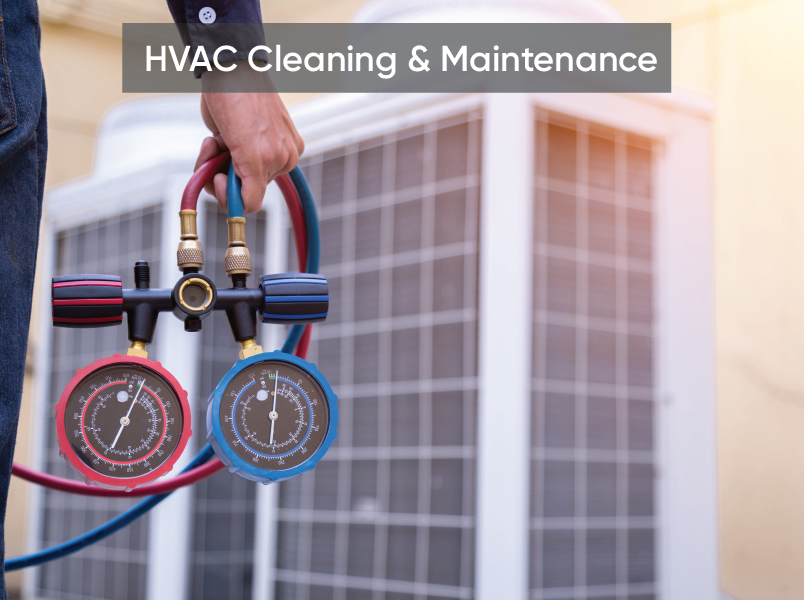
Like with any other piece of equipment in your home, HVAC systems should be routinely inspected and serviced so that your family can breathe cleaner air and enjoy a comfortable and safe indoor environment. With preventive HVAC maintenance contracts, a small investment can prevent expensive breakdowns, keep energy bills low and extend the overall life of your equipment.
